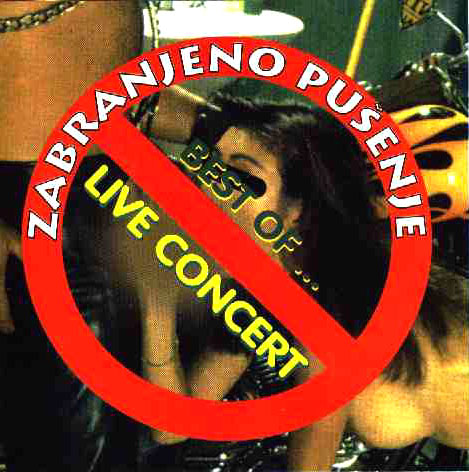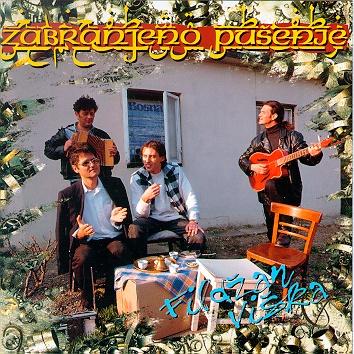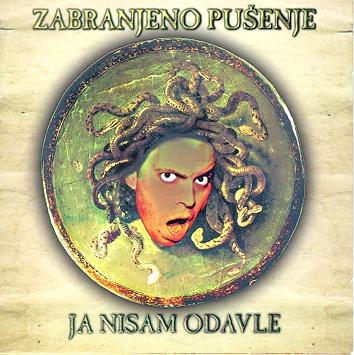 One earlier Sarajevo rock band - Zabranjeno Pusenje - wrote a song about
Pisonja and Zuga (described as a very simple two guys at a party thrown by
some sophisticated chick whose obviously well placed parents worked
somewhere in Iraq; the party gets busted and lovely host asks Pisonja and
Zuga to take a present from her - under a condition not to open it until
morning; the present of course was a package of dope and Pisonja and Zuga
got arrested). Zabranjeno Pusenje had lyrics similar to the Clash. It always
seemed so realistic. Still, I was never sure if Pisonja and Suga were real
characters (their names would be in English like Piss and Dirt). They were, my
friend told me. They were really close, inseparable friends, kind of raw. But
they are dead now. They both died in the war. Well, it seems that they always
had bad luck. One of them died in Bosnian (Muslim) Army, another one in
Croatian (HVO) Army. At least they did not die fighting each other (which was
also a possibility, since Bosnians and Croats fought, too). That would be really,
really bad luck. They both died fighting Serbian Army. And the guy who wrote a
song about them, Nele, he is a Serb. He left Sarajevo with his wife and kid in
the beginning and now lives in Belgrade. Therefore there are two bands Zabranjeno Pusenje - one by him in Belgrade and one by his pals in Sarajevo. The Belgrade Pusenje does well in Ljubljana, and the Sarajevo Pusenje does well in Zagreb.
One earlier Sarajevo rock band - Zabranjeno Pusenje - wrote a song about
Pisonja and Zuga (described as a very simple two guys at a party thrown by
some sophisticated chick whose obviously well placed parents worked
somewhere in Iraq; the party gets busted and lovely host asks Pisonja and
Zuga to take a present from her - under a condition not to open it until
morning; the present of course was a package of dope and Pisonja and Zuga
got arrested). Zabranjeno Pusenje had lyrics similar to the Clash. It always
seemed so realistic. Still, I was never sure if Pisonja and Suga were real
characters (their names would be in English like Piss and Dirt). They were, my
friend told me. They were really close, inseparable friends, kind of raw. But
they are dead now. They both died in the war. Well, it seems that they always
had bad luck. One of them died in Bosnian (Muslim) Army, another one in
Croatian (HVO) Army. At least they did not die fighting each other (which was
also a possibility, since Bosnians and Croats fought, too). That would be really,
really bad luck. They both died fighting Serbian Army. And the guy who wrote a
song about them, Nele, he is a Serb. He left Sarajevo with his wife and kid in
the beginning and now lives in Belgrade. Therefore there are two bands Zabranjeno Pusenje - one by him in Belgrade and one by his pals in Sarajevo. The Belgrade Pusenje does well in Ljubljana, and the Sarajevo Pusenje does well in Zagreb.


How two U.S. pontoon bridges tied up international press for two weeks in Bosnia more successfully than the snow blizzard (missing the first casualty)
Perry and Shalikashvili did not fly to Tuzla. They flew to Orasje and then walked over the pontoon bridge spanned over river Sava. They wanted to be sure that it is really there after two weeks of difficulties with building those pontoon bridges. Meanwhile 2000 troops were taken over Sava in low-tech, unseaworthy (but apparently riverSavaworthy) vessels provided by Croatian locals, which became the talk of the press in Croatia. Anticipating that bridges would be established any time soon and that M1-A tanks would soon roar en-masse, sinking the bridges below the water level, so to appear as if caterpillars are gliding over the water (the trick Christ used to walk on the water?), like Pentagon P.R. guys earlier promised, providing them with a Somalia-like spectacle, the American press corps waited patiently in North Bosnian mud for two weeks. This is how Reuters missed Begosh - the first American casualty. He got a Purple Heart for driving his humvee over a landmine that exploded. In an AP picture and on TV he appeared on a stretcher with his legs carefully covered. We don't want any panic, do we? Reuters missed all that. It has tons of pictures of pontoon bridges, though: including the picture of a truck carrying destroyed Begosh's humvee (over a pontoon bridge, of course).
Problems with Apache helicopters, that jewel of American aerospace military ingenuity: they don't like storms and lightning, snow and cold, dust and hot weather, wind, rain. They are practically useful only in Southern California.
There are other problems with American high tech weapons. Take for example Apache helicopters. Do you remember how they had troubles flying in the Desert Storm operation because if it was too windy sand would clog their fine turbines? They don't like snow blizzards either: around Christmas time in Bosnia, some of them got lost in Bosnian blizzard. Russian mercenary pilots would take that dangerous flight from Tuzla to Bihac for 2000 DM and a bottle of Vodka in past years. Then in Moscow, too, post offices don't shut down if there is just 2 feet of snow out there. America is not really a winter country. So, the pilots decided to emergency land near Banja Luka. Fortunately, that was after Dayton agreement (in which Banja Luka Serbs got more than they bargained for), so instead of slicing their throats, Serbs almost killed them with too much fatty foods and unbelievably strong moonshine in a party that lasted until the weather cleared. God knows who drove helicopters back to the base. Then again there is no DWI laws in Bosnia (yet).
One would think that at least moderate Mediterranean climate would be suitable too Apache whimsical nature. Wrong. Last summer my friends seized one. They were vacationing on island Mljet, a densely forested, sparsely populated island just few minutes (by helicopter) northwest of Dubrovnik, and approximately the same distance from the U.S. aircraft carrier stationed in Adriatic. An Apache helicopter patrol got caught in one of those summer storms with a lot of gusty winds, lightning and quick, dense rainfall. They lost radio connection with their base and something got screwed with their radar. So, they decided to emergency land. One helicopter was hovering over Mljet's helidrom for a while, hesitating to proceed (pilot said later that he saw anti-aircraft guns down there around the helidrom, and well he wasn't sure if somebody would shoot, and he did not want to shoot because he didn't have any idea where he was and whom he would be shooting at...). Finally a crew of two closed their eyes and landed - right in front of my friends, who strolled from the beach to helidrom (well, Apache helicopters don't usually land on Mljet every morning). Pilots jumped out from the helicopter waving with their maps and asking kind of in panic (heh, this was before Dayton agreement..): "where are we?" My friend told them that they were on Mljet. That was not satisfying. They were interested in WHICH COUNTRY they were. Then, my friend told them that they are in Croatia, which calmed them down visibly, and they responded with "Toni Kukoc". It is good that Croatia has excellent basketball players. That makes Croatia intrinsically a good country.
Second they asked for telephone, radio or any other means of communication, not immediately available on Mljet (which is basically a National Park resort with very little amount of residents). My friends took them to a nearby cafe. They ask pilots, just casually, who was the commander, but it seemed that pilots couldn't readily remember and they started a humorous quarrel pointing to each other saying: "he is the commander." This was cool. In about an hour, with the storm still raging, an unseaworthy skiff propelled by 4 HP motor, noisily arrived carrying two individuals that carried symbols of Croatian Army on their rags. One of them had an obsoletely old gun. Another had formidable moustache. Meanwhile neighborhood kids started to play with the helicopter, and one of the pilots run to lock the gun before somebody accidentally blew the village away. The Croatian soldiers disembarked and walked straight to Americans. They did not speak any English, so my friends proved handy as translators. "Why didn't they ask a permission to land?" - "Because our radio was not working." - "Uhu, let us all go to our base, where you will explain that to our commander, and then we will see what to do with you." At that point Americans got really scared, not because they thought they'd be killed by Croats, but because they didn't really believe that that 8 feet long skiff would be able to carry them all alive to the base - after all, even the mighty Apache was humbled by the storm.
My friends went with them. One of the Croat soldiers stayed to guard the helicopter from kids (because they were the only enemy force on the island, bent on bending and screwing precious things in the helicopter). Riding in the boat through the storm and the six feet high swell, everybody in boat was wet and Croatian soldier amusingly apologized to Americans for getting them wet. At the base pilots met their colleagues (from other helicopters) who stood there with their hands up, while Croat soldiers were walking around them giggling. Two pilots who were with my friends, already understood that Croatian soldiers have no intent to harm them, so they laughed at sight of their friends who looked like POWs just because they couldn't understand their captors (and their captors could not understand them). Croat commander decided to send a fax describing the situation to UNPROFOR command in Zagreb (which was at that time responsible for all UN/NATO operations in Croatia and Bosnia). This was the only fax machine on the island, and commander was very proud of it. It definitely had a special place in his life.
Once the fax was sent, they could only wait (the chain of command was long: UNPROFOR notifies UN, UN notifies NATO, NATO notifies American military command, American military command notifies its ship in Adriatic...), so Croatian commander decided to shorten the wait the Balkan way: with food and drink (American soldiers are bound to gain weight in their mission in Bosnia, obviously; after all if you look all military commanders on all sides of Bosnian war - they all gained tremendous amounts of weight over the past few years. Only civilians look kind of skinnier.). The Croatian feast consisted of roast lamb and strong Mediterranean wine. Over the dinner jokes were exchanged. Commander joked that Croats should keep pilots and their helicopters and paint HV (Croatian Army) on helicopters and have pilots teach Croats fly them. He argued that would end the Serb advances in Bosnia swiftly. Pilots managed to put up with the joke in good humor.
Finally the answer arrived from Zagreb: pilots should be let go as soon as the storm is over, and they should immediately return to their aircraft carrier for necessary repairs on their helicopters (it seems that lightning messed up some fine communications electronics in their machines). Croat and American soldiers exchanged military pins (Americans got Croat checkerboards and Croats got American airborne units badges). Everybody took a picture with Apaches. American pilots took a bunch of picturesque brochures from a nearby tourist office and shove them under the instruments in the nose of helicopter's cockpit. They liked the island. My friends asked them if they ever visited Dubrovnik. They did not. So, my friends advised them to fly a fifteen minutes south-east and land on Stradun (Dubrovnik's corso) and play the same stint there - we lost contact with our vessel, where are we, oh, you have a cute city here, and the wine is just fine. Later, my friends got letters from the pilots and a thank you letter from the air craft carrier command.
A Chechen cab driver in NYC
Returning home from the last party we attended we were driven in a yellow cab with a political message. On the window behind driver's head facing passengers on a back-seat a hand-written note said something like: Russians out of Chechenya, and the usual approach (Russians = slaughterers, Chechens = poor innocent victims). I was stoned and a little paranoid: what if that burly, frown, mustached driver takes our Croatian for Russian? Maybe it would be better to speak English? We definitively assured him that we were on the right side. After all Serbs and Russians are big friends, aren't they? That was, by the way, the first time I saw a Chechen (it was his first time to see Croats, too). I always believed that in New York city lives at least one sample of each existing world ethnic group. I know that a lot of people (American and foreign) don't like that about New York city. I find it highly interesting, because it is a proof that people may cooperate for common good while still preserving their cherished ethnic and religious differences, and this quality is hard to find in other places on this planet.
Bosnia- Chechenya
Nobody suggests that Chechens are peace and democracy loving fellows after they took hostages at Pervomajskaya. But by Yugoslav rule of thumb, ratified by the NATO protectorate over Bosnia, ethnic groups should be allowed to assert their sovereignty over the territory they claim for themselves. So, why are not Chechens protected by UNPROFOR against the brutal Russian onslaught. Grozni was a city larger than Sarajevo - yet it is now destroyed heavier than Vukovar. After all, Russian enormous firepower by far outguns Serb roughnecks. Which also means, to stop Russians, UN would have to have command over nuclear weapons. Which it doesn't have. But NATO has that command. Of course, that means back to fall-out shelters built in fifties and sixties. So, Chechens would be rather left to their own devices.